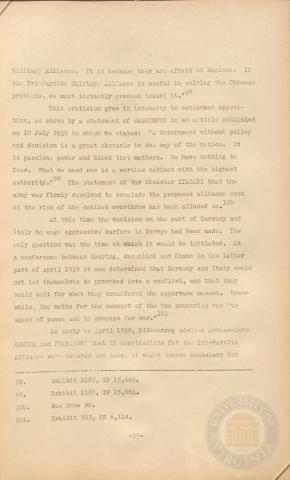
Page 39
| Parent | Japanese - German - Italian Collaboration |
|---|---|
| Date | |
| Language | English |
| Collection | Tavenner Papers & IMTFE Official Records |
| Box | Box 14 |
| Folder | Japan, Germany, Italy Collaboration and Introduction |
| Repository | University of Virginia Law Library |
Military Alliance. It is because they are afraid of England. If the Tri-Partite Military Alliance is useful in solving the Chinese problems, we must instantly proceed toward it."98
This criticism grew in intensity to outspoken opposi¬tion, as shown by a statement of HASHIMOTO in an article published on 10 July 1939 in which he stated? "A Government without policy and decision is a great obstacle in the way of the nation. It is passion, power and blood that matters. We have nothing to
fear. What we need now is a wartime cabinet with the highest
authority.99 The statement of War Minister ITAGAKI that the army was firmly resolved to conclude the proposed alliance even at the risk of the cabinet overthrow has been alluded to.100
At this time the decision on the part of Germany and Italy to wage aggressive warfare in Europe had been made. The only question was the time at which it would be initiated. At a conference between Goering, Mussolini and Ciano in the latter part of April 1939 it was determined that Germany and Italy would not let themselves be provoked into a conflict, and that they would wait for what they considered the opportune moment. Mean¬while, the motto for the conduct of the two countries was "to
speak of peace and to prepare for war."101
As early as April 1939, Ribbentrop advised Ambassadors OSHIMA and SHIRATORI that if negotiations for the Tri-Partite Alliance were delayed too long, it might become necessary for
98Exhibit 2185, TP 15,660.
99Exhibit 2185, TP 15,661.
100See Note 96.
100.Exhibit 505, TP 6,114.
